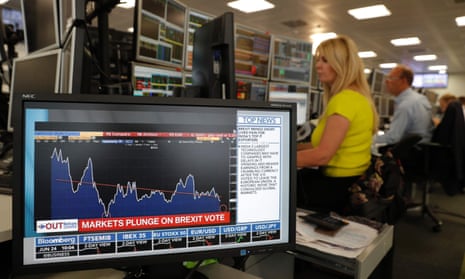Britain’s decision to leave the EU has left the country on the brink of a recession that will reverberate around the world, economists have said amid fears of a drop in investment and turmoil on global markets.
As Thursday night’s drama unfolded, economists immediately started to assess whether George Osborne’s pre-referendum warning of a year-long “DIY recession” would become a reality.
Even before the victory for the leave camp had been confirmed, City analysts and businesses produced a flurry of dire economic warnings of months or even years of subpar growth.
“Britain’s shock vote to leave the EU has unleashed a wave of economic and political uncertainty that likely will drive the UK into recession,” said Samuel Tombs, the chief UK economist at the thinktank Pantheon Macroeconomics.
David Owen, the chief European economist at Jefferies International, said a technical recession – two consecutive quarters of contraction – may now be a given, followed by a period of very slow growth. He also said the UK’s long-term economic potential, known as trend growth, would be lower, “which has to impact the valuation of assets, particularly equities”.
The Treasury had forecast that a vote to leave the EU would knock national output and push the UK into recession. Its team of economists predicted a fall in GDP of between 3.6% and 6%; a plunge in the value of sterling; lower house prices; a reduction in wages of between 2.8% and 4%; more than half a million job losses; more borrowing; and higher inflation.
But that was based on an assumption that policy would remain unchanged, in other words, there would be no tax cuts or interest rate moves to shore up the economy.
The City was already speculating on Friday that the Bank of England’s early assurances that it would do whatever was needed to stabilise the economy and markets would include a cut to official borrowing costs and extra money being pumped into the economy. That in itself would mitigate the economic impact of Brexit, some experts said.
But not all economists thought a recession was inevitable.
“Brexit is likely to be a net negative to the economy, although the lack of any precedent means that predictions must be ‘caveated’,” said Martin Beck, of the Oxford Economics consultancy.
“The boost to net exports from cheaper sterling and a likely cut in bank rate by the monetary policy committee should mean that the economy avoids recession.”
Business groups, which had mostly supported a remain vote or declined to take a position, sought to turn attention away from recession predictions and towards moves to cushion any economic blow.
“Businesses will do everything within our power to avoid a recession,” said Carolyn Fairbairn, the director-general of the CBI. “There is inevitably going to be an effect on investment to an extent. The more the uncertainty is removed the less that is likely.”
The British Chambers of Commerce said businesses would be looking for “swift, decisive, and coordinated action” from the government and the Bank of England as needed.
Adam Marshall, the BCC’s acting director general, said: “Businesses need action to maintain economic stability, a timeline for exit, and answers to their many practical, real-world questions about doing business during and after this historic transition.
“Firms want help to get Britain back to business at a time of great uncertainty. The health of the economy must be the No 1 priority – not the Westminster political postmortem.”
While initial focus was on the UK, economists were quick to warn that the consequences of the vote would spread around the world. Expectations of a US interest rate rise receded dramatically and there were predictions the European Central Bank would have to cut interest rates in the eurozone further into negative territory.
There were also worries that the UK’s decision to leave could fan political uncertainty throughout the EU.
The vote would “undoubtedly send shock waves through the global economy”, most obviously through the remaining EU members, said Janet Henry, the global chief economist at HSBC bank.
“It will likely disrupt confidence, trade and investment but the economic contagion alone is unlikely to derail the eurozone’s recovery entirely,” she said.
“As for the rest of the global economy, much will depend not just on how exposed various countries are to weakening demand in the EU, but on how sustained the financial market moves prove to be. Even for countries with a relatively low trade exposure, heightened volatility and uncertainty are likely to lead to weaker growth through delayed investment and consumer spending and weaker employment.”
Economists at the bank ING also warned of implications for the EU.
“Financial market turmoil, plunging sentiment indicators and new uncertainty are likely to dent consumer confidence, bringing the recent tender revival of consumer spending to an end, and are also likely to further undermine investment,” they wrote in a research note.
On their base case scenario, ING economists said they expected the leave vote to shave 0.3 percentage points off eurozone GDP growth over the next two years, with countries with important trade and investment ties to the UK, such as Ireland, the Netherlands and Belgium, hit the hardest.
“In a more acrimonious divorce, uncertainty is likely to last much longer, reducing eurozone growth in the period 2016-17 by 0.6 percentage points,” they added.

Comments (…)
Sign in or create your Guardian account to join the discussion